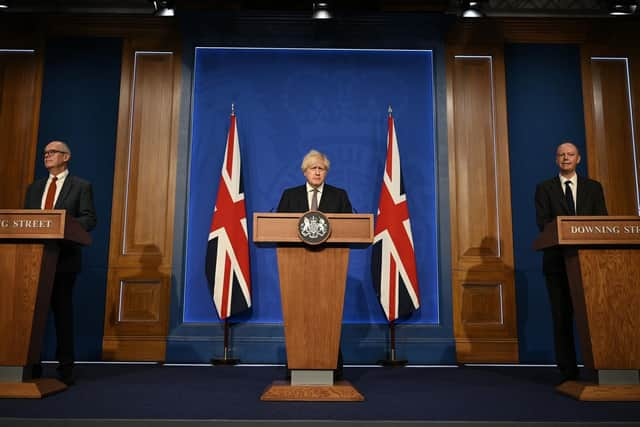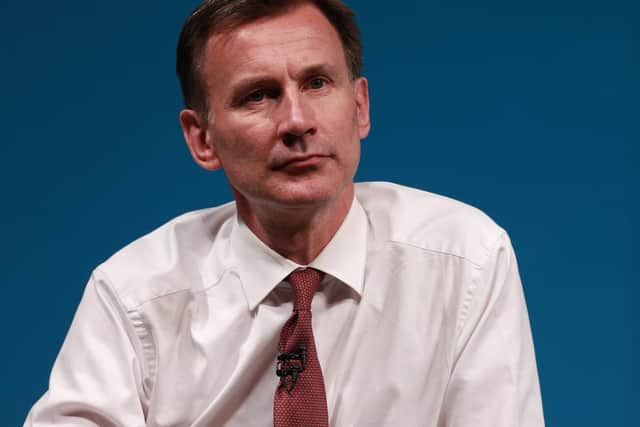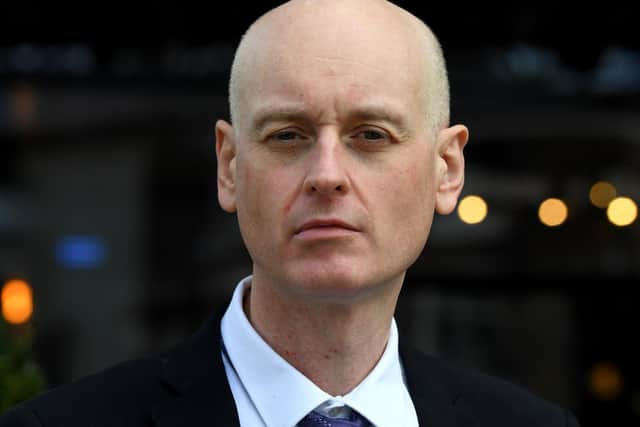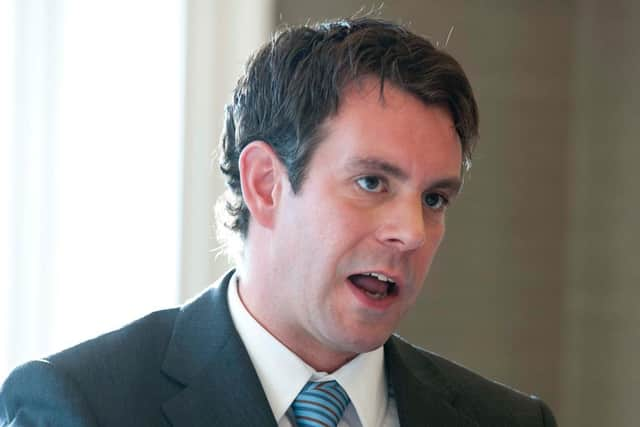The UK's response to coronavirus, which led to needless deaths and economic damage in Lancashire is blasted
and live on Freeview channel 276
While lives were needlessly lost due to a the wrong early response to the pandemic in the UK, later action such as the “haphazard” tier system of lockdowns, threatened the Lancashire economy leaving businesses “scarred” county figures have said.
They were reacting to a report on the crisis from study, from the cross-party Science and Technology Committee and the Health and Social Care Committee.
Advertisement
Hide AdAdvertisement
Hide AdIt said serious errors and delays at the hands of the Government and scientific advisers cost lives during the Covid-19 pandemic, according to a damning report from MPs. It said the UK’s preparation for a pandemic was far too focused on dealing with a flu-like disease rather than a more serious Sars-style virus, while ministers waited too long to push through lockdown measures in early 2020.


In the wide-ranging report, MPs said the UK’s pandemic planning was too “narrowly and inflexibly based on a flu model” that failed to learn the lessons from Sars and Mers, which many other countries followed.
Former chief medical officer Professor Dame Sally Davies told MPs there was “groupthink”, with infectious disease experts not believing that “Sars, or another Sars, would get from Asia to us”.
The UK’s national risk register, which was in place at the start of the pandemic, said “the likelihood of an emerging infectious disease spreading within the UK is assessed to be lower than that of a pandemic flu”. It also said only up to 100 people may die during any outbreak of an emerging infectious disease.
Advertisement
Hide AdAdvertisement
Hide AdOnce Covid-19 emerged in China, MPs said the UK policy was to take a “gradual and incremental approach” to interventions such as social distancing, isolation and lockdowns.


In their study, they said this was “a deliberate policy” proposed by scientists and adopted by UK governments, which has now been shown to be “wrong” and led to a higher death toll.
The MPs said the “decisions on lockdowns and social distancing during the early weeks of the pandemic – and the advice that led to them – rank as one of the most important public health failures the United Kingdom has ever experienced”.
On the issue of whether the Government was pursuing a policy of herd immunity, which has proved controversial, MPs said that while it was not an official Government strategy, there was a “policy approach of fatalism about the prospects for Covid in the community”.
Advertisement
Hide AdAdvertisement
Hide AdExperts and ministers sought to “only moderate the speed of infection” through the population – flattening the curve – rather than seeking to stop its spread altogether.


The report added: “The policy was pursued until March 23 because of the official scientific advice the Government received, not in spite of it.”
Even as late as March 12 2020, Sir Patrick Vallance, the Government’s chief scientific adviser, told a Government press conference that it was not possible to stop everyone being infected, and nor was that a desirable objective.
The following day, members of the Scientific Advisory Group for Emergencies (Sage) also said they were “unanimous that measures seeking to completely suppress spread of Covid-19 will cause a second peak”.
Advertisement
Hide AdAdvertisement
Hide AdAfter hearing evidence from people including the Prime Minister’s former adviser Dominic Cummings, and former health secretary Matt Hancock, the MPs concluded it was only in the days leading up to the March 23 lockdown that people within Government and advisers “experienced simultaneous epiphanies that the course the UK was following was wrong, possibly catastrophically so”.


A paper from Imperial College London, presented to Sage, was among models showing that an unmitigated epidemic could result in around 500,000 UK deaths.
MPs concluded it was “astonishing” it took so long for Sage to say a full lockdown was needed and for the Government to implement one, adding they thought the evidence showed a lockdown was “inevitable”.
In other criticisms in the 151-page report, MPs said the UK also implemented “light-touch border controls” only on countries with high Covid rates, even though 33 per cent of cases during the first wave were introduced from Spain and 29 per cent from France.
Advertisement
Hide AdAdvertisement
Hide AdThey also argued that earlier social distancing and locking down “would have bought much-needed time” for vaccine research to bear fruit, for Covid treatments to be developed and for a proper test and trace system to be set up.
They said the “early weeks of the pandemic expose deficiencies in both scientific advice and Government action”, with no real idea of how far the virus had spread and a down playing of the role of asymptomatic transmission.
Furthermore, there was a false belief that the public would not accept lockdown, or would only do so for a short period of time.
The lack of testing capacity also meant there was nowhere near enough data on Covid spread, while abandoning community testing on March 12 was regarded by MPs as a “seminal failure”.
Advertisement
Hide AdAdvertisement
Hide AdElsewhere, MPs said that thousands of elderly people died in care homes during the first wave of the pandemic, something that showed “social care had a less prominent voice in Government during the early stages of the pandemic than did the NHS”.
The decision not to test people discharged from hospitals to care homes early on was a failure and led to deaths, they added.
In a joint statement, Tory MPs Greg Clark and Jeremy Hunt, who chair the committees, said: “The UK response has combined some big achievements with some big mistakes.
“It is vital to learn from both to ensure that we perform as best as we possibly can during the remainder of the pandemic and in the future. “Our vaccine programme was boldly planned and effectively executed. Our test and trace programme took too long to become effective.
Advertisement
Hide AdAdvertisement
Hide Ad“The Government took seriously scientific advice but there should have been more challenge from all to the early UK consensus that delayed a more comprehensive lockdown when countries like South Korea showed a different approach was possible.
“In responding to an emergency, when much is unknown, it is impossible to get everything right.
“We record our gratitude to all those – NHS and care workers, scientists, officials in national and local government, workers in our public services and in private businesses and millions of volunteers – who responded to the challenge with dedication, compassion and hard work to help the whole nation at one of our darkest times.”
The report also pointed to the regional tier system as being confusing for the public, adding that it was not “watertight” enough to prevent infection spreading.
Advertisement
Hide AdAdvertisement
Hide AdElsewhere, scientific evidence for some measures was lacking, such as the imposition from September 24 2020 of a 10pm curfew on pubs, or the banning of outdoor children’s sports clubs, MPs said.
Paul Foster, development manager at the Lancashire-headquartered Federation of Small Businesses, said while Government financial help throughout the pandemic was welcomed, there were many things that could have been done better to help businesses and retain jobs.
He said: “The tier system was complicated and businesses had to try to understand rules across different areas.
“Areas quickly moved from one tier to the next and private sector confidence was undermined, with businesses not knowing whether they could trade or operate effectively from one week to the next.
Advertisement
Hide AdAdvertisement
Hide Ad“There was a lot of confusion and a financial support system for compensation which was based on an outdated business rates system, meaning that many who needed support had no grants of note which they could access to help them try to keep afloat.
“Small businesses still bear the scars from lockdowns and there is a worrying amount of debt as businesses have borrowed to survive over the last 18 months.
Clearly there are lessons to be learned from all those involved in the response to the pandemic, but for the small business sector the pressing priority is to try to get back to pre-Covid levels of turnover and profitability.”
Regarding the second lockdown, MPs said that had more stringent social distancing measures been adopted during the autumn, they could have “reduced the seeding of the Alpha variant across the country, slowed its spread and therefore have saved lives”.
Advertisement
Hide AdAdvertisement
Hide AdHowever, MPs also noted it was true that the Alpha variant only became known about in December 2020.
Across the board, the report criticised a national failure to share data between central and local government, adding that the NHS was squeezed due to shortages of staff.
Leader of Preston council Coun Matthew Brown, said councils did not get any clear messaging at the start of the outbreak as to how to deal with it.
He said; “There was no sense of urgency from Government, we were very concerned, questions were being asked but there seemed to be a polite but ambivalent response.
“The tiering systems was a complete mess.
Advertisement
Hide AdAdvertisement
Hide Ad“It was very difficult. Firstly councils had been disempowered by years of the Conservative Government in terms of powers and finances to deal with this.
“There were in the fist few weeks of employers not adhering to social distancing measures, the PPE equipment was not adequate and did not arrive in the required time for the NHS and care staff.
“It was a complete nightmare, the delay in going into lockdown and then not really having the effective tools to deal with it.
“The decision of tiering seemed to be made by the Secretary of State alone. We started meeting every week with public health professionals from Lancashire County Council, Blackpool and Blackburn public health professionals. The recommendations they were putting forward were largely ignored.
Advertisement
Hide AdAdvertisement
Hide Ad"The tiering system was imposed on us in October. It was haphazard.
"That was abandoned a few weeks later when we went into lockdown again. If that had continued that would have impoverished a large number of people at the time as furlough was due to come to an end. It was only towards the end of the pandemic that things started to get better.”
Regarding test and trace, the national report said the “slow, uncertain, and often chaotic performance of the test, trace and isolate system severely hampered the UK’s response to the pandemic”, MPs said.
It also noted “unacceptably high death rates among people from black, Asian and minority ethnic communities” and those with learning disabilities.
Advertisement
Hide AdAdvertisement
Hide AdBut MPs offered praise in two areas – treatments and vaccines – saying ministers were “correct to identify that a vaccine would be the long-term route out of the pandemic” and supported research and development.
Shadow health secretary Jonathan Ashworth said of the report: “This is a damning report by a cross-party group of MPs into the monumental errors made by ministers in responding to the pandemic.”
A Government spokesman said: “Throughout the pandemic we have been guided by scientific and medical experts and we never shied away from taking quick and decisive action to save lives and protect our NHS, including introducing restrictions and lockdowns.
“Thanks to a collective national effort, we avoided NHS services becoming overwhelmed and our phenomenal vaccination programme has built a wall of defence, with over 24.3 million infections prevented and more than 130,000 lives saved so far.
“As the Prime Minister has said, we are committed to learning lessons from the pandemic and have committed to holding a full public inquiry in spring.”